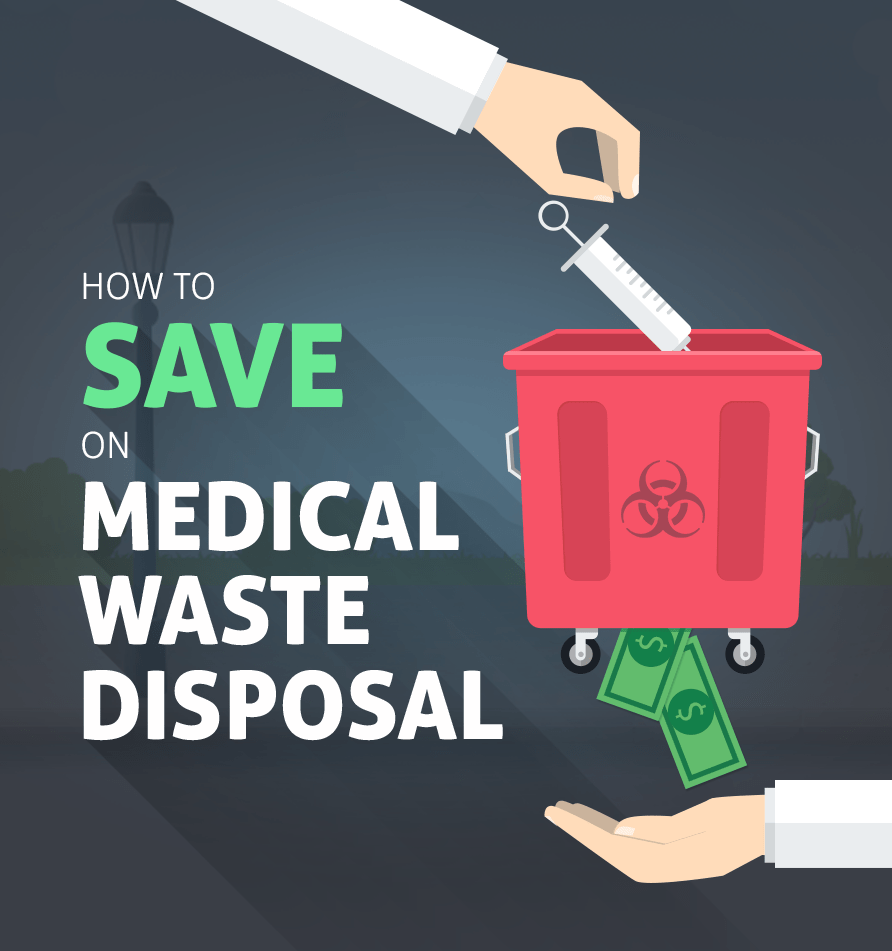Turnkey Medical Waste Removal Service: Seamless Disposal for Healthcare Facilities
Wiki Article
Effective Techniques of Medical Garbage Disposal
Effective techniques of clinical waste disposal are critical in keeping public health and ecological safety. Clinical waste, including sharps, pathological waste, and pharmaceutical waste, must be taken care of and taken care of correctly to avoid the spread of infections and shield the atmosphere. This calls for adherence to strict laws and the implementation of professional waste management practices.Correct segregation of medical waste, safe and secure and secure storage space, efficient therapy and disinfection techniques, and environmentally-friendly disposal alternatives are key parts of a reliable clinical waste disposal system. Expert waste management solutions play an essential function in making certain conformity with regulations and reducing the threats linked with incorrect disposal. By using these techniques, health care centers can add to a much safer and cleaner atmosphere while securing the well-being of the community.
Correct Partition of Clinical Waste
Correct partition of medical waste is necessary for ensuring the efficient and safe disposal of these potentially harmful materials. Medical waste refers to any kind of waste created throughout health care tasks, such as health centers, centers, research laboratories, and study facilities. It includes a vast array of products, such as made use of needles, syringes, infected dressings, ended or unused medicines, and biological products.By setting apart clinical waste, medical care centers can decrease the danger of infections, injuries, and ecological contamination. The process involves classifying waste into various kinds, such as sharps, infectious waste, pharmaceutical waste, and non-hazardous waste. Each type needs specific handling, product packaging, and disposal approaches to protect against exposure to medical care workers, waste monitoring workers, and the general public.
To make sure correct segregation, healthcare facilities should develop clear guidelines and provide adequate training to personnel. This consists of educating staff members on the various waste groups, correct product packaging techniques, and the usage of suitable containers - WasteX Medical Waste Disposal. In addition, clear signs and color-coding systems can be applied to promote the recognition and partition of various waste kinds
Safe and Secure Storage of Medical Waste
Safe and secure storage space of medical waste is crucial for preserving the honesty and containment of possibly hazardous products. Proper storage not only secures medical care workers and the general public from direct exposure to harmful materials however additionally protects against ecological contamination.To ensure risk-free storage space, clinical centers should follow details standards. To start with, waste ought to be stored in watertight and puncture-resistant containers that are labeled suitably. These containers ought to be snugly secured to prevent any leak or spills. Additionally, the storage area need to be safe and secure and inaccessible to unauthorized employees, decreasing the danger of accidental direct exposure.
Correct partition of medical waste is also important for secure storage space. Various kinds of waste, such as sharps, transmittable products, and pharmaceutical waste, ought to be separated to avoid cross-contamination. This segregation can be accomplished with using color-coded containers or containers.
Normal monitoring and examination of the storage area are important to recognize any kind of possible threats or violations. This includes checking for signs of damage or degeneration in the containers, making sure correct ventilation, and monitoring temperature and humidity degrees.
Reliable Treatment and Sanitation Techniques

One typically utilized therapy method is autoclaving, which entails subjecting the waste to high-pressure vapor at temperatures over 121 degrees Celsius. This procedure effectively eliminates bacteria and ruins transmittable representatives, rendering the waste secure for additional disposal. An additional technique is incineration, which involves shedding the waste at heats. Incineration not just gets rid of microbes yet additionally minimizes the waste volume via burning.
Chemical WasteX Medical Waste Disposal sanitation is another reliable technique for dealing with medical waste. This approach includes making use of disinfectants such as chlorine compounds, phenolic compounds, or hydrogen peroxide to eliminate or inactivate virus (WasteX Medical Waste Disposal). Chemical sanitation is often made use of for liquid waste, such as laboratory samples or physical liquids
Recently, different therapy methods such as microwave disinfection, irradiation, and organic treatment have actually likewise gained interest. These techniques provide benefits such as minimized environmental effect and energy usage compared to conventional approaches.
Environmentally-friendly Disposal Options
In the world of medical garbage disposal, thinking about environmentally-friendly choices is vital. Healthcare facilities produce a substantial quantity of waste, including contagious products, drugs, and chemicals, which can posture severe risks to human wellness and the environment otherwise managed correctly. There are several environmentally-friendly disposal options offered that can help minimize these dangers.
Recycling medical waste involves segregating and refining particular materials for reuse or repurposing. Additionally, some health care centers have executed reusing programs for certain clinical tools or devices, further lowering waste generation.
This method involves converting medical waste right into power through procedures like incineration or anaerobic food digestion. Anaerobic digestion, on the other hand, breaks down organic waste in the lack of oxygen, generating biogas that can be made use of for electricity or warmth generation.

Advantages of Professional Waste Monitoring Solutions
One substantial benefit of expert waste administration services is the improved effectiveness in disposing and handling of clinical waste. By using expert waste management solutions, healthcare facilities can ensure that all clinical waste is taken care of and disposed of appropriately, minimizing the risk of contamination and the spread of conditions.Expert waste monitoring solutions utilize skilled and skilled personnel that are well-informed regarding the guidelines and standards for clinical waste disposal. They have accessibility to specialized devices and devices that enable them to handle various sorts of clinical waste securely and effectively. These solutions likewise have well-established procedures and methods in place to ensure that waste is segregated, packaged, moved, and disposed of in conformity with neighborhood, state, and federal policies.
Furthermore, professional waste monitoring solutions can provide healthcare centers with thorough waste management remedies. They can offer solutions such as waste collection, transport, therapy, and disposal, tailored to the certain demands and demands of the center. This removes the problem of taking care of waste inside, enabling healthcare staff to concentrate on offering top quality client care.
Verdict
Finally, reliable techniques of clinical waste disposal include appropriate segregation, safe storage, therapy and disinfection, and environmentally-friendly disposal alternatives (WasteX Medical Waste Disposal). These methods guarantee the secure handling and monitoring of clinical waste, stopping the spread of infections and shielding the atmosphere. Specialist waste monitoring solutions play a crucial role in implementing these approaches and making certain conformity with laws. By adhering to these methods, health care facilities can add to a more secure and much healthier setting for both people and the neighborhood.Clinical waste, including sharps, pathological waste, and pharmaceutical waste, need to be taken care of and disposed of properly to prevent the spread of infections and safeguard the setting.Proper segregation of clinical waste, protected and secure storage, efficient treatment and sanitation approaches, and environmentally-friendly disposal options are vital elements of a reliable clinical waste disposal system. The procedure entails classifying waste right into different kinds, such as sharps, infectious waste, pharmaceutical waste, and non-hazardous waste. By using professional waste management services, healthcare centers can ensure that all clinical waste is managed and disposed of appropriately, decreasing the danger of contamination and the spread of diseases.
Professional waste administration services utilize qualified and knowledgeable personnel who are educated about the laws and standards for clinical waste disposal.
Report this wiki page